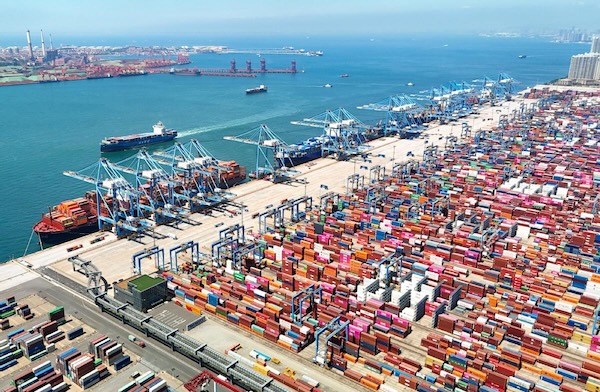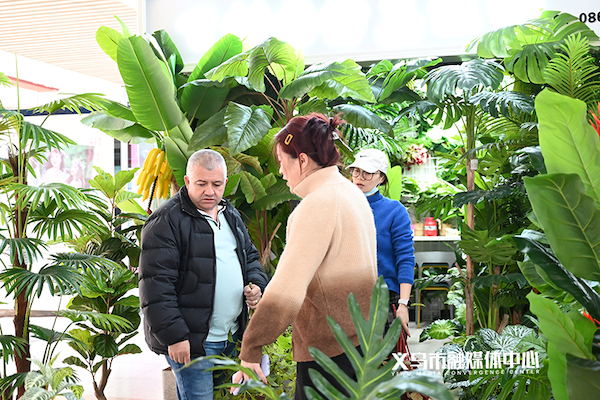Exporters race to find space on ships

An aerial view of Qingdao Port in Shandong province on June 6. [ZHANG JINGANG/FOR CHINA DAILY]
Lu Chao, head of the marketing department at Zhejiang Xinqiaoyuan International Logistics Co, has been facing a tough time over the past five weeks.
Though her freight forwarding company, which is based in Ningbo, Zhejiang province, has successfully booked cargo space on ships, securing shipping containers for loading goods has proved difficult.
To locate empty containers, Lu and her team members have been diligently making online reservations, adhering to a strict daily schedule.
"If we don't get them today, there won't be any more available. We will start again tomorrow afternoon," said Lu.
She said booking containers online has become a key daily task, sometimes even requiring assistance from all the staff members of the company.
Sharing a similar experience, Guo Xinxin, head of customer service at Zhejiang Xiecheng International Freight Forwarding Co in Yiwu, Zhejiang, said a significant portion of her daily workload involves scrambling for containers.
"Container truck drivers also have to be quick. Once they receive the pickup bar code, they must relentlessly search for empty containers. If they are too slow, the containers could be reassigned to other companies," said Guo.
The tight supply of containers is primarily due to ships rerouting and delays caused by the ongoing tensions in the Red Sea region, along with a surge in demand driven by a large number of new container vessels being built and launched, said Li Muyuan, executive vice-president of the China Container Industry Association in Beijing.
To meet the shipping needs of foreign trade companies and improve the efficiency of container use, some shipping companies have reduced the time to pick up empty containers from 48 to 72 hours previously, to just 24 hours now, said Li.
Jin Xiaomin, chairman of Zhejiang Kingston Supply Chain Group Co Ltd, another Yiwu, Zhejiang-based exporter, said due to a shortage of containers, several exporters and shipping companies have begun buying their own.
Prices of secondhand containers have also soared. The cost of a used container was around 15,000 yuan ($2,068) at the beginning of the year, but has surged to 23,000 yuan early this month.
At Ningbo Xinhuachang International Containers Co, a container manufacturer based in Ningbo, Zhejiang province, trucks loaded with bamboo wood flooring and steel coils continue to arrive at its workshops. The company said that the raw materials in its warehouse can only meet production needs for two to three weeks.
Ningbo Xinhuachang is now operating on a two-shift schedule to meet order volume. Two months ago, it was operating a single shift.
"Our production capacity is currently at an unprecedented high since the founding of our company. There is a possibility that in June and July, we may even surpass the levels achieved in May," said Zhang Zhuohui, the company's assistant president.
This is because of high demand from clients at home and abroad, and the order volume is substantial and urgent, said Zhang.
The sudden surge in orders has also led to a supply shortage of upstream raw materials. Additionally, the rainy season in certain parts of China is affecting the situation, making the supply of bamboo wood flooring particularly tight, he added.
In addition to shipping traditional goods like household appliances, machinery and clothing through containers, many automakers have also relied heavily on these freight boxes to ship their vehicles abroad, forced by a situation of insufficient car carriers. This has also added to high demand for containers, said Liu Shuang, an official at Beilun Customs, a branch of Ningbo Customs.
For instance, Ningbo Port exported a total of 64,000 vehicles in the first four months. Of these, around 50,000 were shipped using containers. This has also driven an increase in container usage.

 Yiwu and Qingtian: Global supermarket alliance spurs economic growth
Yiwu and Qingtian: Global supermarket alliance spurs economic growth Artificial flowers: Yiwu's evergreen business
Artificial flowers: Yiwu's evergreen business Yiwu Intl Trade Market reopens after Spring Festival holiday
Yiwu Intl Trade Market reopens after Spring Festival holiday